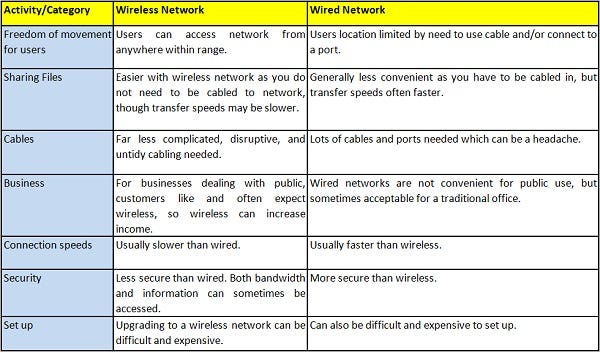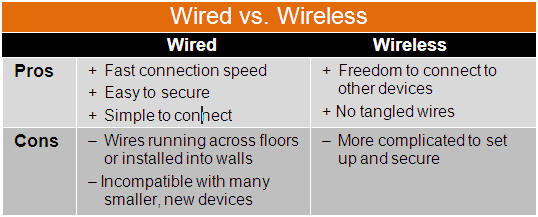
Pros And Cons of Wired And Wireless Networks
When setting up a network, one of the key decisions to make is whether to go with a wired or wireless connection. Both options have their own set of advantages and disadvantages, and understanding them can help you make an informed choice that aligns with your specific needs and circumstances.

Credit: www.nojitter.com
Wired Networks
Wired networks, as the name suggests, use physical cables to connect devices. This method has been around for a long time and has proven to be reliable and efficient in many scenarios.
Pros Of Wired Networks
- Reliability: Wired connections typically offer more stable and consistent performance compared to wireless networks.
- Security: Since the data is transmitted through cables, wired networks are generally less susceptible to unauthorized access.
- Speed: In most cases, wired connections provide faster data transfer rates, making them suitable for bandwidth-intensive tasks.
Cons Of Wired Networks
- Installation: Setting up wired networks often involves laying cables, which can be time-consuming and may require professional assistance.
- Mobility: Users are restricted by the physical connection to the network, limiting their mobility within the premises.
- Maintenance: Regular maintenance is necessary to ensure that the cables and connections remain in good condition.
Wireless Networks
Wireless networks, on the other hand, transmit data through radio signals, eliminating the need for physical cables and offering more freedom of movement to users.
Pros Of Wireless Networks
- Flexibility: Wireless connections allow users to access the network from different locations within the coverage area.
- Convenience: Setting up wireless networks is relatively easier and more convenient, especially in environments where running cables is challenging.
- Scalability: Wireless networks can be easily expanded to accommodate new devices without the need for additional cables.
Cons Of Wireless Networks
- Security: Wireless networks are more vulnerable to unauthorized access and interference, making them potentially less secure than wired connections.
- Speed: In general, wireless connections may offer slower data transfer rates compared to wired networks, particularly in environments with signal interference or long distances from the access point.
- Reliability: Signal disruptions and connectivity issues can occur due to environmental factors and obstacles that obstruct the wireless signal.

Credit: hmbalaha.wordpress.com
Frequently Asked Questions On Pros And Cons Of Wired And Wireless Networks
What Are The Pros And Cons Of Wireless Vs Wired Connections?
The pros of wireless connections include cost-effectiveness for small networks. However, wireless networks are more vulnerable to security threats. Wired connections offer faster speeds and stability but may require more installation and maintenance.
What Are The Advantages And Disadvantages Of Wire And Wireless Communication System?
Wireless communication offers the advantage of mobility and cost-effectiveness, as it eliminates the need for physical cables. However, it can be more vulnerable to security threats and is susceptible to interference, which may result in slower connectivity speeds. On the other hand, wired communication provides faster and more stable connections, but it requires installation and maintenance, and can make the space look untidy.
Overall, the choice between wired and wireless communication depends on specific needs and priorities.
What Are Two Pros And Cons To Having A Wireless Network?
Pros of having a wireless network: Cost-effective for small setups and easy to set up. Cons: Vulnerable to security threats and can experience slower speeds due to interference.
What Are 5 Disadvantages Of A Wired Network?
Five disadvantages of a wired network are: limited mobility, longer installation time, higher maintenance requirements, risk of untidy appearance or tripping hazards, and susceptibility to slower speeds due to physical obstructions.
Conclusion
Ultimately, the decision between wired and wireless networks depends on various factors, including the specific needs of the users, the nature of the environment, the required level of security, and the available budget. While wired networks are known for their reliability and security, wireless networks offer more flexibility and convenience. By carefully considering the pros and cons of each option, you can choose the most suitable network type for your situation.
